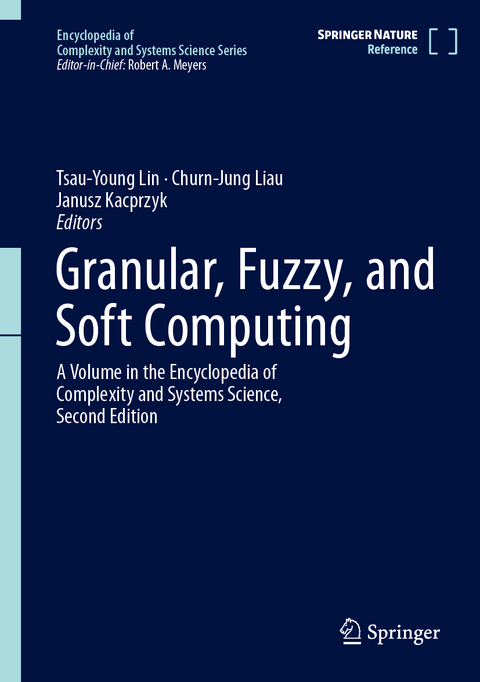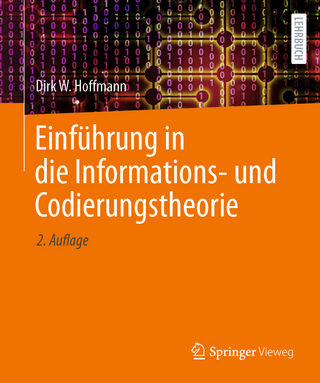
Granular, Fuzzy, and Soft Computing
Springer-Verlag New York Inc.
978-1-0716-2627-6 (ISBN)
For this volume of ECSS, Second Edition, many entries have been updated to capture these new developments, together with new chapters on such topics as data clustering, outliers in data mining, qualitative fuzzy sets, and information flow analysis for security applications. Granulations can be seen as a natural and ancient methodology deeply rooted in the human mind. Many daily "things" are routinely granulated into sub "things": The topography of earth is granulated into hills, plateaus, etc., space and time are granulated into infinitesimal granules, and a circle is granulated into polygons of infinitesimal sides. Such granules led to the invention of calculus, topology and non-standard analysis. Formalization of general granulation was difficult but, as shown in this volume, great progress has been made in combing discrete and continuous mathematics under one roof for a broad range of applications in data science.
Tsau-Young Lin holds a Ph.D. from Yale University and is Professor of Computer Science at San Jose State University. He has published over 250 papers and has edited a number of books. Prof. Lin coined the term Granular Computing (GrC) and has researched the subject for the past two decades. He is Founding President of the Rough Set Society and President of the GrC Society. His areas of expertise include data science (deep data analysis, data/knowledge mining, uncertainty), topology-based computing (algebraic, geometric, point set), granular and rough computing, and cyber security. Churn-Jung Liau received a B.S., an M.S. and a Ph.D in computer science and information engineering from National Taiwan University in 1985, 1987 and 1992 respectively. He then joined the Institute of Information Science, Academia Sinica, Taiwan and is currently a tenured full research fellow. His major research interest includes aaplied logic, artificial intelligence, and uncertainty reasoning. Janusz Kacprzyk is Professor of Computer Science at the Systems Research Institute, Polish Academy of Sciences, WIT – Warsaw School of Information Technology, and Chongqing Three Gorges University, Wanzhou, Chinqgqung, China, and Professor of Automatic Control at PIAP – Industrial Institute of Automation and Measurements. He is Honorary Foreign Professor at the Department of Mathematics, Yli Normal University, Xinjiang, China. He is Full Member of the Polish Academy of Sciences, Member of Academia Europaea, European Academy of Sciences and Arts, European Academy of Sciences, Foreign Member of the: Bulgarian Academy of Sciences, Spanish Royal Academy of Economic and Financial Sciences (RACEF), Finnish Society of Sciences and Letters, and Flemish Royal Academy of Belgium of Sciences and the Arts (KVAB). He was awarded with 4 honorary doctorates. He is Fellow of IEEE, IET, IFSA, EurAI and SMIA. His main research interests include the use of modern computation computational and artificial intelligence tools, notably fuzzy logic, in systems science, decision making, optimization, control, data analysis and data mining, with applications in mobile robotics, systems modeling, ICT etc. He authored 7 books, (co)edited more than 100 volumes, (co)authored more than 600 papers, including ca. 80 in journals indexed by the WoS. His bibliographic data are: Google Scholar: citations: 28094; h-index: 74, Scopus: citations: citations: 8416; h-index: 40, ResearcherID (M-9574-2014): citations: 9014; h-index=42 and Web of Science: citations: 6696 (5517 without self-citations) h-index: 34. He is the editor in chief of 7 book series at Springer, and of 2 journals, and is on the editorial boards of ca. 40 journals.. He is President of the Polish Operational and Systems Research Society and Past President of International Fuzzy Systems Association.
Cooperative Multi-hierarchical Query Answering Systems.- Dependency and Granularity in Data -Mining.- Fuzzy Logic.- Fuzzy Probability Theory.- Fuzzy System Models Evolution from Fuzzy Rulebases to Fuzzy Functions.- On Genetic-Fuzzy Data Mining Techniques.- Granular Computing and Data Mining for Ordered Data: The Dominance-Based Rough Set Approach.- Granular Computing, Information Models for.- Granular Computing, Introduction to.- Granular Computing and Modeling of the Uncertainty in Quantum Mechanics.- Philosophical Foundation for Granular Computing.- Granular Computing: Practices, Theories, and Future Directions.- Granular Computing, Principles and Perspectives of.- Granular Computing System Vulnerabilities: Exploring the Dark Side of Social Networking Communities.- Granular Model for Data Mining.- Granular Neural Networks.- Granulation of Knowledge: Similarity Based Approach in Information and Decision Systems.- Multi-Granular Computing and Quotient Structure.- Non-standard Analysis,An Invitation to.- Information System Design Using Fuzzy and Rough Set Theory.- Rough Set Data Analysis.
| Erscheinungsdatum | 24.04.2023 |
|---|---|
| Reihe/Serie | Encyclopedia of Complexity and Systems Science Series | Granular, Fuzzy, and Soft Computing |
| Zusatzinfo | 110 Illustrations, color; 83 Illustrations, black and white; XXXI, 933 p. 193 illus., 110 illus. in color. |
| Verlagsort | New York, NY |
| Sprache | englisch |
| Maße | 178 x 254 mm |
| Themenwelt | Informatik ► Theorie / Studium ► Kryptologie |
| Informatik ► Theorie / Studium ► Künstliche Intelligenz / Robotik | |
| Mathematik / Informatik ► Mathematik ► Angewandte Mathematik | |
| Schlagworte | combinatorial topology • Data Science • fuzzy sets and logic • Granular computing (GrC) • granular structure • machine learning applications • point set topology • Rough Set Theory • value or variable granulation |
| ISBN-10 | 1-0716-2627-2 / 1071626272 |
| ISBN-13 | 978-1-0716-2627-6 / 9781071626276 |
| Zustand | Neuware |
| Informationen gemäß Produktsicherheitsverordnung (GPSR) | |
| Haben Sie eine Frage zum Produkt? |
aus dem Bereich


